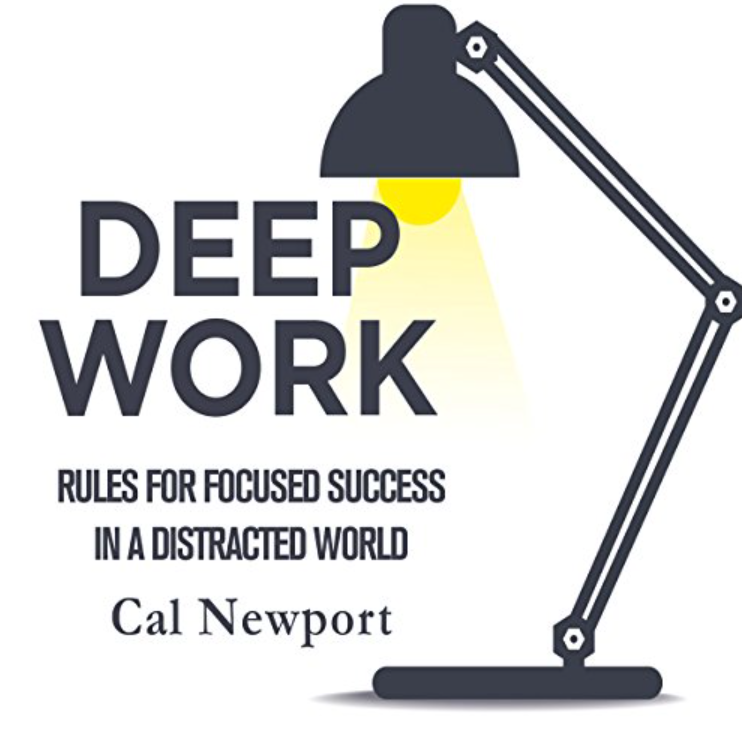If you haven’t read the book Deep Work yet, then we would highly recommend doing so. Reading the book will definitely change how you think about work and productivity.
Cal Newport is a computer science professor at Georgetown University and author of many great books on productivity. Deep Work: Rules for Focused Success in a Distracted World is one of his most successful books. The book Deep Work is about how to become more productive by developing a deep work practive and eliminating distractions and focusing only on what matters.
In this blog post, I will summarize the main points of the book, I will also tell you who should read this book, explain the best ideas from Deep Work and also review the book at the end of this post.
Deep Work Summary
Deep work is a book by Cal Newport about training oneself through practice into becoming very skilled in cognitively demanding tasks when faced with distractions all around us today, such as social media, email, instant messaging, or streaming services.

It contains many stories from those who have experienced high levels of success due to their concentration skills while providing some advice on how one can become good – even great! – at focusing deeply without interruption by technology.
What is Deep Work?
Deep Work is all about deep thinking, or activities that require intense concentration in which you focus on one task without distraction – these types of tasks can be things like writing papers, reading books, and solving difficult problems.
The idea behind this practice is that if we have periods when we set aside time for deep work throughout our day then it will allow us something called “intellectual depth”.
Deep Work is not about being busy, it’s about getting things done and the book will teach you how to make this happen by working deep – as long as you’re willing to step away from distractions.
It is one of the most underrated and challenging practices among modern knowledge workers, yet it’s also become an increasingly valuable skill.
It refers to any cognitively demanding task that you perform in a state of deep focus–that is, without distractions or interruptions from either your environment or yourself. These tasks span both our professional lives as well as personal intellectual pursuits like artistry and invention.
Best ideas and techniques from the Deep Work
There are some really useful techniques and general ideas that make this book stand out from all those books about productivity.
We will share some of them right now:
Learn How to Practice Deep Work
Learning how to practice deep work requires you to be disciplined and motivated.
Forcing yourself to focus on deep work is one of the biggest challenges you’ll face if you want to succeed, but it’s also the most important thing for your personal success!
Cut out social media
One of the best tips he shares in the book is the idea that you should cut out social media.
Social Media is one of those things that can easily consume your time and attention, which will make it more difficult for you to focus on deep work. If you want to learn more about how you can get rid of social media, you should read his other book, Digital Minimalism where he goes deeper into the topic.
If you can’t get rid of social media, then limit it to 30 minutes per day where you only do one thing at a time (e.g., send emails or check Facebook).
Remove all digital notifications from your computer and phone
Another suggestion for deep work is to remove all digital notifications on your devices. If we’re constantly being pestered by alerts and sounds when working in front of our computers, we’ll be more likely to lose focus on what needs doing before getting distracted by something else.
Stop multitasking
One of the myths that Newport shares are that multitasking is possible for the human brain to do.
It’s actually much more difficult and consumes a lot of your time, which can affect productivity in deep work situations!
In Deep Work Newport also shares plenty of other strategies that are important for everyone who wants to succeed in today’s world. If you want to learn what these tips are make sure to read his book or keep reading this blog post!
Notice when you are doing shallow work
Shallow work is the opposite of deep work. Shallow work is something you can do quickly and without much thought.
Some examples of shallow work are reading emails, answering phone calls, or surfing the internet for information that doesn’t really matter to your current task at hand.
It’s important to recognize when we’re doing these tasks so we can avoid them in deep work situations! We should try our best not to answer any text messages during a deep work session because there would be no point if it was just going to interrupt us again anyways.
Who should read the book Deep Work?
I think you should read the book, Deep Work by Cal Newport if you:
- are looking for ways to improve your productivity
- want a few tips and tricks that can help the way you do work on computers every day
- are constantly juggling multiple tasks and struggle with getting anything done.
It can be also useful if you:
- are a university student with a demanding
- work in an office and want to find out how you can spend time on demanding tasks without interruption, doing creative work whenever you want.
Readers of Deep Work will learn that there is value in deep thinking. They’ll find out why it’s important for them, how they can use these concepts to improve their own lives and the lives of those around them
Who should not read this book?
On the other hand, Deep Work by Cal Newport might not be the best read for you if:
- you are not interested in learning how to maintain a deep focus on tasks and activities
- you are not that interested in productivity
- you are a manager who is managing a ton of people and demands
- you are looking for a quick fix to improve your life
Deep Work review
You can find a lot of reviews of Deep Work online. The book received generally positive reviews highlighting the benefits of deep work, how it’s easy to implement it, and the practicality of its suggestions.
The reviewers who didn’t like the book that much thought that the examples were too anecdotal, and didn’t offer many practical tips to implement deep work into your life.
Personally, I really enjoyed the book and learned a lot from it since it is not just an enjoyable read, but also a practical guide to implementing deep work in your life.
I would give five out of five stars since deep work can really be a life-changing book that will change the way you think about work and can also give you techniques and strategies that you can incorporate into your work
About the author of Deep Work
The author of the book is Cal Newport an American non-fiction author and associate professor of computer science at Georgetown University.
Cal Newport was born June 23, 1982. He completed his undergraduate studies at Dartmouth College and received a Ph.D. in computer science from the Massachusetts Institute of Technology in 2009. He was a post-doctoral associate in the MIT computer science department from 2009-to 2011.
Other Books from Cal Newport
Besides Deep Work, Cal Newport has written the following books:
- How to Win at College (2005)
- How to Become a Straight-A Student (2006)
- How to Be a High-School Superstar (2010)
- So Good They Can’t Ignore You: Why Skills Trump Passion In The Quest For Work You Love (2012)
- Digital Minimalism: Choosing a Focused Life in a Noisy World (2019)
- The Time-Block Planner (2020)
- A World Without Email (2021)
Books similar to Deep Work
If you want to read books that are similar to Deep Work you should consider reading the following books:
- Rules of Productivity: How to focus and get things done by Chris Bailey
- Managing oneself by Peter Drucker
- Creativity, Inc.: Overcoming the Unseen Forces That Stand in the Way of True Inspiration by Ed Catmull and Amy Wallace
- Work Less, Do More: How to Achieve a Life You Love with Just Four Hours a Week by Tony Crabbe.
- Atomic Habits by James Clear
- The Power of Less by Leo Babauta.

